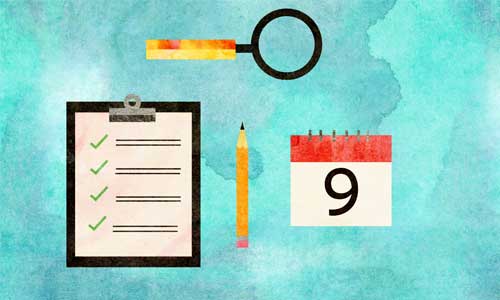Too many people eschew responsibility and blame others for their faults and failures. If they don’t blame others, then they tend to blame the ephemeral: time, weather, traffic, bureaucracy, even G‑d.
Certainly, other people and outside factors influence our lives, but the choices we make, the priorities we set and the path that we take are still ours. While it’s true that everything is directed from Above, the one thing that isn’t are our choices and reactions, and to a large extent, they help determine our destiny.
Here are 10 ways to act more responsibly:
1.Write it down.
Buy a diary and write down every appointment, every promise and every responsibility you have—from paying a bill to seeing your dentist, from renewing your car insurance to remembering birthdays and special occasions. Check your diary every morning. In Pirkei Avot 2:1 (Ethics of Our Fathers), it says that “all our deeds are recorded in a book.” While obviously G‑d doesn’t have “a book” to record our actions, if we write them down, our book is more likely to match His record.
2. Be punctual.
Being late sets in motion a domino effect that fells your entire day and lets other people down. The Talmud tells us that “a person can buy his afterlife in one moment” (Avoda Zara 10b, 17a, 18a). This shows clearly the power inherent in a single moment, so be careful not to waste other people’s time. Shabbat also teaches us to respect deadlines. It comes in every week at a different time, and whenever the sun sets on that day is when all work must stop. Life is time-sensitive.
3. Don’t say yes if you don’t intend to keep your word.
Don’t overextend yourself by accepting a commitment and then say you can’t do it. In Pirkei Avot 1:15, we are taught, “Say little and do much.” Commit less and do more. Everyone will be happier, including you.
4. Don’t get into debt.
The book of Psalms (37:21) describes someone who borrows and does not repay as wicked: “The wicked one borrows but repays not.” Of course, that’s referring to someone who purposely defaults on a loan. Often, people borrow money not knowing how they are going to pay it back, and incurring that kind of debt can lead to reneging on your commitment.
5. Don’t blame others.
Don’t view yourself as a victim, and don’t play the victim either. We are ultimately responsible for our own actions, so don’t underestimate your worth or overestimate another person’s control over you. After the sin of eating from the Tree of Knowledge, when G‑d confronted them, Adam blamed Eve and Eve blamed the snake, neither one willing to take responsibility for what they did. And we’ve been blaming each other ever since.
6. Do what you do to your best ability.
Act with integrity, as we are taught, “I shall not alter the utterance of my lips” (Psalms 89). Moreover, make sure that you are putting in 100 percent of yourself because your actions reverberate for generations. The Midrash (Vayikrah Rabba 34:8) teaches that if Boaz, who gave Ruth some wheat when she was gleaning in his fields, had known that the Bible would record his actions for eternity, he would have served her fatted calves.
7. Be solution-oriented and envision problems that might crop up.
Rabbi Shimeon in Pirkei Avot 2:13 praises the person who can foresee the ramifications of his actions. Be creative in your problem-solving!
8. Apologize when you wrong someone, instead of giving excuses.
The first step in the process of teshuvah (“repentance”) is admitting you messed up. Being defensive or offensive doesn’t leave room for you to make amends, and you’re therefore likely to repeat the mistake with even worse results.
9. Prioritize.
Make sure that you have your priorities straight for living the life you find valuable. When the tribes of Reuven and Gad asked Moses for permission to remain on the other side of the Jordan River, they promised to fight with the rest of the nation after they built pens for their animals and homes for their children. Moses agreed, but told them to first build houses for their children and then pens for their animals, putting their priorities in the right order.
10. Take care of your health.
Eat right, exercise, sleep, relax, get check-ups and surround yourself with healthy relationships. Guarding your health is a mitzvah and your responsibility. Guard your spiritual health as well by keeping away from negative influences. We ask G‑d in our daily prayers and in Pirkei Avot 1:7 “to keep us away from temptation and from bad influences.”
Wishing you much success!




